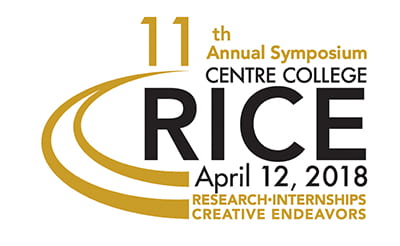BY EMMA PRESBERG – STAFF WRITER
On Thursday, April 12, around 100 students presented their research and independent projects at the 11th annual RICE Symposium. RICE, which stands for Research, Internships, and Creative Endeavors, gives students the opportunity to share what they have been working on.
Whether it is a faculty-mentored research project, an independent study, or an internship project, RICE allows students to gain experience in an academic conference setting while sharing their accomplishments. Students were also given the chance to share any creative art projects they had been working on in the AEGON Gallery in the Jones Visual Arts Center.
What has usually been a one-day event full of people rushing from session to session was turned into a week-long research celebration, which allowed students to fully immerse themselves in the process.
Senior Erika Brewer has participated in RICE the last three years. “The entire week really allows for you, as a presenter, to get out and learn more about research,” she said. “I love the celebration of it because not all students across the nation get to participate in undergraduate research, let alone have an entire week celebrating their accomplishments; it is just a really special thing about Centre.”
Research Week kicked off with Research Exploration Day in the library. This was a chance for students interested in pursuing research in the future to come learn about different research opportunities that professors are currently involved in. “The drop-in research hours on Monday led to some tentative plans for new internships, so we call that a success,” said Leonard Demoranville, a professor of chemistry and RICE Symposium Co-Chair.
On Tuesday, a celebration luncheon was held for students and mentors participating in RICE. At Wednesday’s convocation, the inaugural James W. Barton RICE Symposium Lecture, Dr. Christopher Barton spoke about ways that undergraduate research can lead to community projects.
Demoranville complimented the way Barton wove together his research and the role undergradduate research plays in it. He really highlighted the ways in which undergraduate research can be beneficial not only for students, but also a complete research program,” he said.
The oral presentations and poster session on Thursday then gave students the chance to share their research, something many of them may not have been able to do without this opportunity.
Senior Beka Bruner had been doing research on Food Deserts and Dollar General in Kentucky when Dr. Werner, an environmental studies professor, suggest Bruner present at RICE. “My research experience was amazing,” Bruner said. “I loved learning and collecting data that no one had yet put together. I believe RICE is a very important opportunity for all students. It allows us to grow in our public speaking and presentation skills while also allowing us to prove to ourselves that we are capable of becoming experts in our field of interest.”
Brewer has also seen the benefits of RICE. After giving poster presentations on her work-in-progress, Brewer, along with faculty mentor Dr. Falk, had finally compiled enough research and data to give an oral presentation. “[Doing research] helped me become a better student because I was reading and writing scientific literature which can be pretty dense. I loved getting to ask my own questions and actually search for the answers myself,” she said.
Brewer believes RICE is such a great experience because it exposes underclassmen to the wide variety of research topics we have on campus. “RICE allowed me to basically grow up as a presenter because I was explaining my experiments to our professors as well as other students,” she added.
Since undergraduate research is part of the Centre Commitment, RICE then gives students and professors the chance to celebrate and share all the hard work they have been putting in to their projects. It also encourages other students to participate in undergraduate research and shows them the types of projects they can become involved in.
Demoranville cites two main reasons for why he values RICE: “One is that it is a celebration of the hard work that students and their mentors put into the research that happens on Centre’s campus. While it takes work and effort on the part of both the mentor and the student, it is worth the effort. Celebrating it is completely appropriate. The second reason is that RICE gives students an opportunity to develop their presentation and communication skills. These presentations can be a formative step in getting ready to take the research to presentations outside of Centre’s campus,” he said.
The oral presentations, poster session, and art gallery all give students the chance to expand their communication skills while becoming more confident in their ability to achieve their academic goals.
Faculty mentors see huge growth in their students and get just as excited about RICE as the students do. Dr. Demonarville, as a faculty mentor as well as a RICE Co-Chair, gets the unique chance to watch students grow from different perspectives. “I see this growth most in my own research students,” he said. “Having watched them prepare for the presentation, it is really fun to watch as they improve through multiple practices. As their understanding increases, we are able to have more detailed and in-depth conversations. In the end, it is always great to see them engage with other students and faculty members as experts. It is in those moments that you realize just how much students have grown.”

